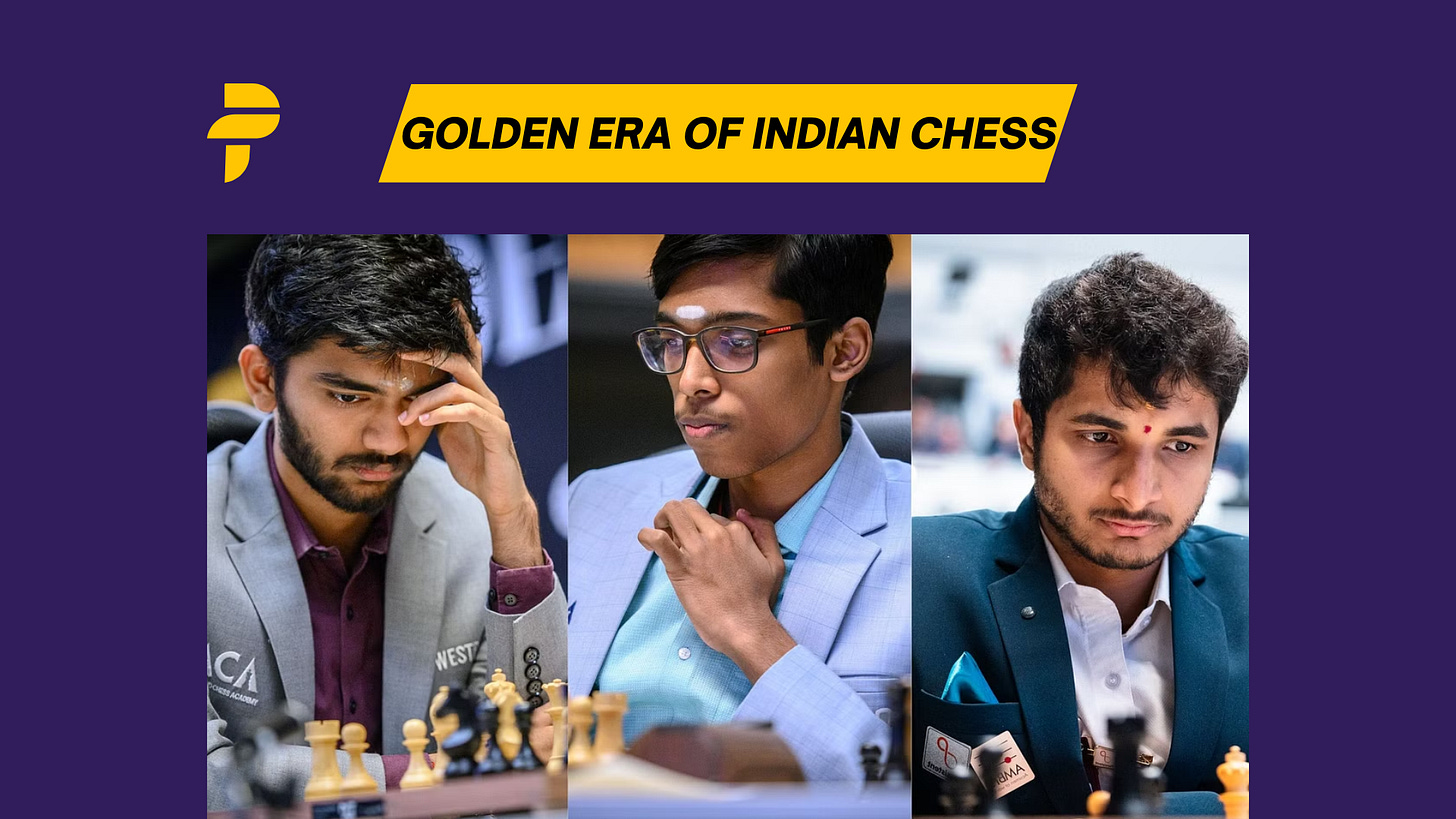Golden Era of Indian Chess?
The Need for Proactive Media and the Rise of Indian Chess: Shifting from Reaction to Recognition
Last week, Gukesh D became the youngest ever to win the FIDE Candidates. While the media focus entirely was on Pragg last year, there was a silent assassin growing in the world of Chess in the name of Gukesh.
At 17, he crossed all boundaries to win the FIDE candidates becoming one of the hottest prodigies in the world of chess. He is also the country’s highest-rated player ahead of Vishy Anand.
Media attention is still on the IPL though.
There is a need for more media coverage about other sports like Chess where the prodigies of India are emerging almost every week.
Need for a better media coverage on Chess:
In the realm of chess, every move counts.
The same holds true for how the Indian media approaches the world of sports. For years, the narrative around Indian sports often followed a reactive pattern, focusing on triumphs post-victory, particularly in sports other than cricket.
But as the chessboard of Indian sports diversifies, a shift towards proactive media coverage becomes not just necessary, but vital.
The Golden Era is here?
The All India Chess Federation's (AICF) President, Sanjay Kapoor, rightly states that Indian chess is basking in a "golden era." A statement not to be taken lightly.
The world of chess is witnessing a transformation, with young talents like R Praggnanandhaa, D Gukesh, and Arjun Erigaisi making rapid strides in the global arena. Their achievements, often celebrated after the fact, reflect a growing dynamism within Indian chess.
There's a strong belief that India will boast over a hundred Grandmasters within two years is a testament to this revolution.
The recent victory of GM Arjun Erigaisi at the Sharjah Master's International Chess Championship and the exceptional feats of Praggnanandhaa and Gukesh have been pivotal moments. These accomplishments demand more than just post-win applause; they require proactive recognition.
The rise of Academies and audience:
The founding of the WestBridge Anand Chess Academy has been essential in fostering emerging talent and offering it direction.
The quality of Indian chess has improved as a result of Viswanathan Anand's participation in coaching talented players. Chess training centers and academies have made it possible for young fans to improve their game.
Thousands of spectators and fans now attend live chess tournaments, increasing spectator participation and fan engagement.
Chess is now more accessible to a larger audience because of increased digital and online presence.
Are There Obstacles to Chess Promotion in India?
Little media coverage compared to other sports.
Corporate sponsorships and financial support for top competitions are lacking.
Need to identify talent and place more emphasis on women's chess.
Role of Media in growing the Sports further:
Gone are the days when only a solitary chess maestro, Viswanathan Anand, dominated the discourse. The emergence of multiple chess prodigies paves the way for a diverse narrative, one that showcases the multifaceted nature of Indian chess.
These rising stars deserve more than a post-victory flash in the pan. Their journeys of growth, dedication, and brilliance deserve to be woven in the media's storytelling.
The media's role isn't confined to just celebrating triumphs; it's about nurturing a culture of appreciation and acknowledgment.
The achievements of these young chess talents are stories of discipline, resilience, and aspirations realized. Imagine the inspiration these stories could instill if they were told before the victory anthem.
The journey ahead:
India's chess journey holds an analogy to chess itself – strategic, intellectual, and multifaceted. While the Indian media has traditionally covered sports like cricket with fervor, a proactive approach is needed to shed light on lesser-celebrated yet equally impactful sporting domains.
Just as every piece on the chessboard has a unique role, every sports discipline in India deserves its time in the limelight.
The recent successes in Indian chess should prompt media outlets to adopt a proactive stance, recognizing these budding stars as they embark on their journeys, rather than merely when they clinch titles.
The media's role in shaping the narrative of Indian sports is immense, and it's time to amplify that influence.
As India's chess talents continue to evolve, proactive media coverage can be the catalyst that ignites passion, drives change, and builds a sporting culture that reverberates with diverse achievements.
Let's make the stories of Praggnanandhaa, Gukesh, and Erigaisi known, not just as chess champions, but as embodiments of dedication and inspiration, in a world where recognition comes not after the win, but along the journey. 🏆♟️
Share this article for it to reach a wider audience and do follow the Playbook Pulse Newsletter for more such articles.




